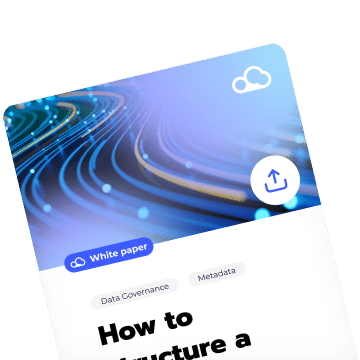
The role of data governance in data mesh
Are you ready to unleash the full potential of your organization’s data? Data mesh is more than just a set of rules – It’s a holistic approach to data governance that promotes collaboration and drives data-driven decision-making. With a data mesh, you can improve data quality, access, and insights while maintaining the security and compliance your business needs. Any data team’s goal should be to produce high-quality data for fast and easy consumption, but centralized data teams face many obstacles in attempting to achieve this. Inefficient or poorly executed governance doesn’t need to be one of them.
Weak data governance execution often occurs due to the following:
- A lack of time or budgetary resources
- Competition for influence between business units
- Poor communication
- Stakeholders missing from policymaking
Companies must overcome these and other challenges to become truly data-driven organizations. However, a more inspired approach to data governance in a data mesh architecture provides dynamic solutions.
Data governance in a data mesh system
Execution for governance often rests with a centralized IT team. While perhaps a logical home for governance, it does present a common challenge. These teams are already well-tasked with collecting, storing, and serving an entire organization’s data. Adding the additional responsibility for data governance, too, can feel like an unwanted burden. In data mesh, data is decentralized. Independent teams own, analyze, and serve their data through models known as Data Products. However, having multiple teams responsible for data would seem to present more governance challenges, not fewer. Yet, the secret sauce of data mesh is the transformation of data governance itself.
A data mesh architecture is essentially a data management design that:
- Decentralizes data, with independent data teams retaining ownership of information
- Transforms data into analytical models and serves these abstractions to BI teams
- Champions self-service data
- Forms a collaborative approach to data governance
These essential elements of a data mesh are woven together by a firm yet flexible layer of data governance. But this approach also yields greater security and more robust data insights by:
- Placing responsibility and accountability for trustworthy data on independent data teams
- Championing self-service data
- Inspiring a data-driven culture of innovation and collaboration
In a decentralized environment, data lives in multiple places. As experts in their own information, data teams build and serve data products to the organization. BI teams query these data products to extract insights suitable for their area of focus. And leadership uses those insights to make decisions on virtually every aspect of operations. Throughout these processes, data governance guides and facilitates intended outcomes.
Federated data governance
Data mesh governance teams include representation from each data producer and user team. This federated governance team designs the specifications for all Data Products in the Mesh. Establishing these standards is inarguably hard work. However, every stakeholder stands to benefit profoundly from this collaboration. For those accessing the models, there are no surprises. Business Intelligence teams have direct access in an entirely self-service method. BI teams can quickly locate reliable data and use native tools and techniques to perform their duties by leveraging a quality data catalog.
Access and security policies are designed and implemented by this federated governance team. Compliance improves with every aspect of an organization’s governance strategy designed and embraced by each functional area. Stakeholder involvement in data governance is ongoing, but this commitment is no longer a large burden on a single IT team. Instead, every area is informed, involved, and invested in governance. The data mesh comes alive when data teams, BI, and others meet to manage their organization’s data governance. The opportunity for dynamic connections between producers and users of data leads to new channels for contact and cooperation between teams. These connections can enhance and promote real-time problem-solving between these teams. And it opens the door to real-time collaboration on data products and analysis, leading to faster and deeper data insights. Data governance in a data mesh ends the data silos and logjams of the past.
The compelling role of data governance in data mesh
The role of data governance in a data mesh architecture is to uphold security, design, and usability standards. At the same time, allowing BI to extract maximum value from an organization’s data is crucial in today’s business environment. Crafting and enforcing governance as a team ensures that each functional area’s interests are represented. Data teams retain control and stewardship of their data. BI users have a front-row seat to advocate for and influence access policies, and when businesses are ready to grow, new data teams can form quickly using the existing models and pipeline design to scale rapidly and efficiently.
Conclusion
The role of data governance in a data mesh architecture is compelling. It delivers a competitive advantage over rivals who struggle to produce and analyze data. It assembles a federated data governance team, leading to collaboration between data producers and users. And it lays the foundation for a truly data-driven organization by building a culture of innovation.
Discover the benefits of creating an intuitive data catalog to fit your needs! Request a demo of DataGalaxy’s Data Knowledge Catalog, an all-in-one Data Catalog that offers out-of-the-box actionability with fully customizable attributes, powerful visualization tools, standardized business glossaries, and AI integration to help organizations easily document, link, and track all their metadata assets on one dynamic platform.




